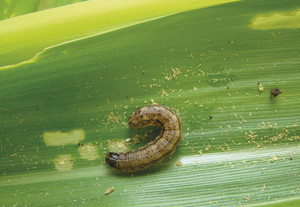
Embrapa milho e sorgo
The Baculovirus spodoptera virus attacks only the fall armyworm and is not harmful to manEmbrapa milho e sorgoA virus deadly to the fall armyworm (Spodoptera fugiperda)—considered to be the pest most destructive to corn crops—is the principal raw material of an agricultural bioinsecticide developed by Embrapa Maize & Sorghum in Sete Lagoas, in the Brazilian state of Minas Gerais. The Baculovirus spodoptera virus attacks only the fall armyworm, which is the larval stage of a moth and is not harmful to humans or any other animal. The product, an alternative to agrochemical-based treatments to fight the pest, has been licensed to Vitae Rural, a company in Uberaba, Minas Gerais, and will be available for sale to farmers beginning in October 2017. The production process for the Embrapa-developed bioinsecticide involved propagating the virus in laboratory-raised fall armyworms. The studies were led by Fernando Valicente, an agronomist and researcher at Embrapa Maize & Sorghum. The fall armyworm also attacks cotton, lettuce, sugarcane, potatoes, rice, soybeans, tomatoes and other agricultural products. Damage to the corn begins when the moth lays its eggs on the leaf and the worms emerge after two to three days. They begin feeding on the plant, mainly the whorl, or funnel, which is the cone of overlapping leaves on mainly young plants in the growth phase. The bioinsecticide is applied to the plant diluted in water and kills between 75% and 95% of the worms, which lose their appetite when infected.
Republish